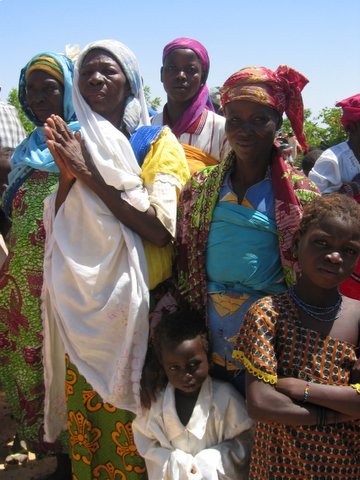Send your question to Umbra!
Q. Dear Umbra,
When buying clothes, I try to be a good environmentalist slash cheap college student, and my college town is blessed with a number of different thrift stores (Kiwanus, Salvation Army, Goodwill, and one run by the local PTA). Are any of these better than the others in terms of helping people and helping the planet? Which should I buy from/donate to? Thanks!
TKO
Ann Arbor, MI
 Most clothes donated in the U.S. wind up being sold to people in developing nations.Photos: Jennifer PredigerA. Dearest TKO,
Most clothes donated in the U.S. wind up being sold to people in developing nations.Photos: Jennifer PredigerA. Dearest TKO,
As Mark Twain once said, “Clothes make the man. Naked people have little or no influence on society.” Your clothes-mindedness is commendable, TKO, a fitting (and fitted) way to have a positive impact on society and less of one on the environment.
Secondhand threads are among the most fashionable and eco-friendly garments. They embody one of the three R’s: Reuse. In so doing, they save resources, including that precious green resource — cash.
But not all secondhand clothing options are created equal. Because clothes are valuable, there’s a significant economy around secondhand wear. Like many moneymakers, used clothes have gone global. According to the Council for Textile Recycling, about 61 percent of donated clothes are exported to other countries.
This poses a few conundrums. Shipping more than half of the 2.5 billion pounds of post-consumer textile product waste, aka used clothes, each year to far away places can have a sizable carbon (and cotton and polyester) footprint. Your old discarded “Another Day, Another Doughnut” shirt may make its way across oceans. When it reaches its destination, it will probably clothe someone. But chances are it will also have a suffocating impact on local textile businesses. For more on that troubling t-shirt, check out The Root piece entitled “Dead white people’s clothes: How the used clothes you send to Africa are killing the local textile industries.”
 Local textiles are being threatened by “dead white people’s clothing.” So how can you avoid giving your clothes away to secondhand outfits that go against your moral fibers?
Local textiles are being threatened by “dead white people’s clothing.” So how can you avoid giving your clothes away to secondhand outfits that go against your moral fibers?
For starters, as much as you may want to get rid of stuff, avoid tossing threads into conveniently located “clothing donation” containers, unless you know who owns the bins and are comfortable with what they do with the donated duds. Many of the big yellow and blue bins you see in parking lots are actually owned by for-profit enterprises that sell your clothes, for a profit, to people in developing countries. Another downside to those bins is they don’t offer an itemized receipt, which you’ll need in order to claim a tax deduction for your donation.
Another good rule of thumb is to buy secondhand clothes from causes you believe in. Some charities, especially larger ones such as Goodwill and The Salvation Army, resell donated clothes to make money to support great programs. Goodwill, for instance, provides much needed job training and family support; the Salvation Army provides much needed jobs for ex-convicts. Buy your clothes there to support these causes.
You may also want to consider donating your clothes to local charities that give the clothes to people in need or sell them inexpensively at local thrift stores. This kind of secondhand sharing cuts down on transportation emissions and helps your community. Charity shops, thrift shops, hospice shops, or resale shops can be found here. If you’re uncertain how a local shop uses the donations, just call them. It’s worth asking your local PTA and Kiwanis what they do with clothing donations.
Where else can you feel good and give to a cause in your community? Old prom dresses get another chance to dance here. Or try Dress for Success, an organization that gives clothing to women who need business attire to wear on job interviews.
To get and give in the same fell swoop, freegans, fashionistas, and ensemble assemblers can:
• Create a free clothing bin on campus. Free bins are stylish, hyperlocal and money-free.
• Swap! You’ve had hand-me-downs, but have you ever had hand-me-overs? Clothing swaps are the finest way to shop. Host one or be a guest at one and give away and get plenty of new (to you) duds. There’s even a national network of clothing swaps.
Try that all on for size, TKO. You’re sure to be a total knock out.
Secondhandily,
Umbra




